
The ICV – Péter Horváth Green Controlling Award
As business partners, controllers are also required to actively support the implementation of sustainability goals. Together with the Péter Horváth Foundation, the ICV supports its members and the entire controlling community with expertise in this area. The most innovative and effective “green” controlling solution for the design and management of ecological strategies, programs, projects and measures in companies and public institutions is awarded annually to promote the discussion of the “green challenge” in controlling.
Impressions from the 2025 Award ceremony
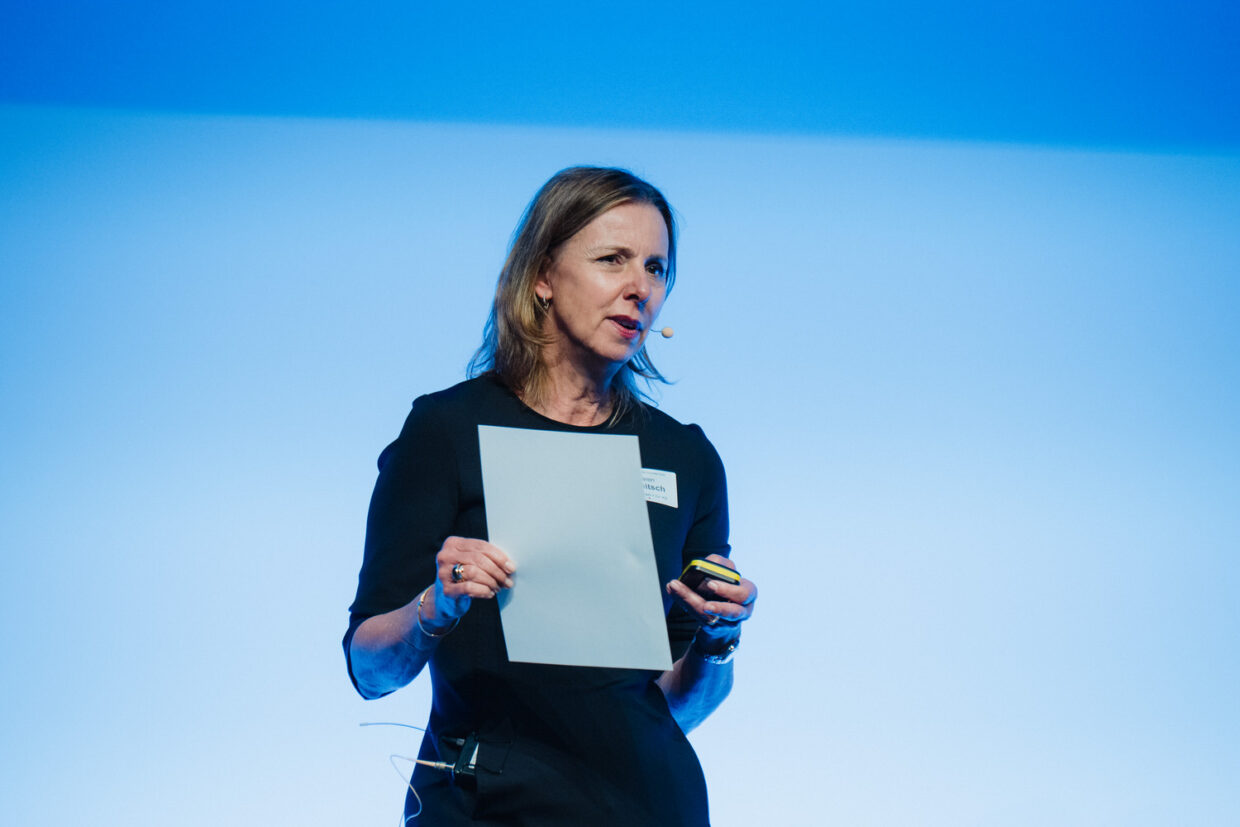
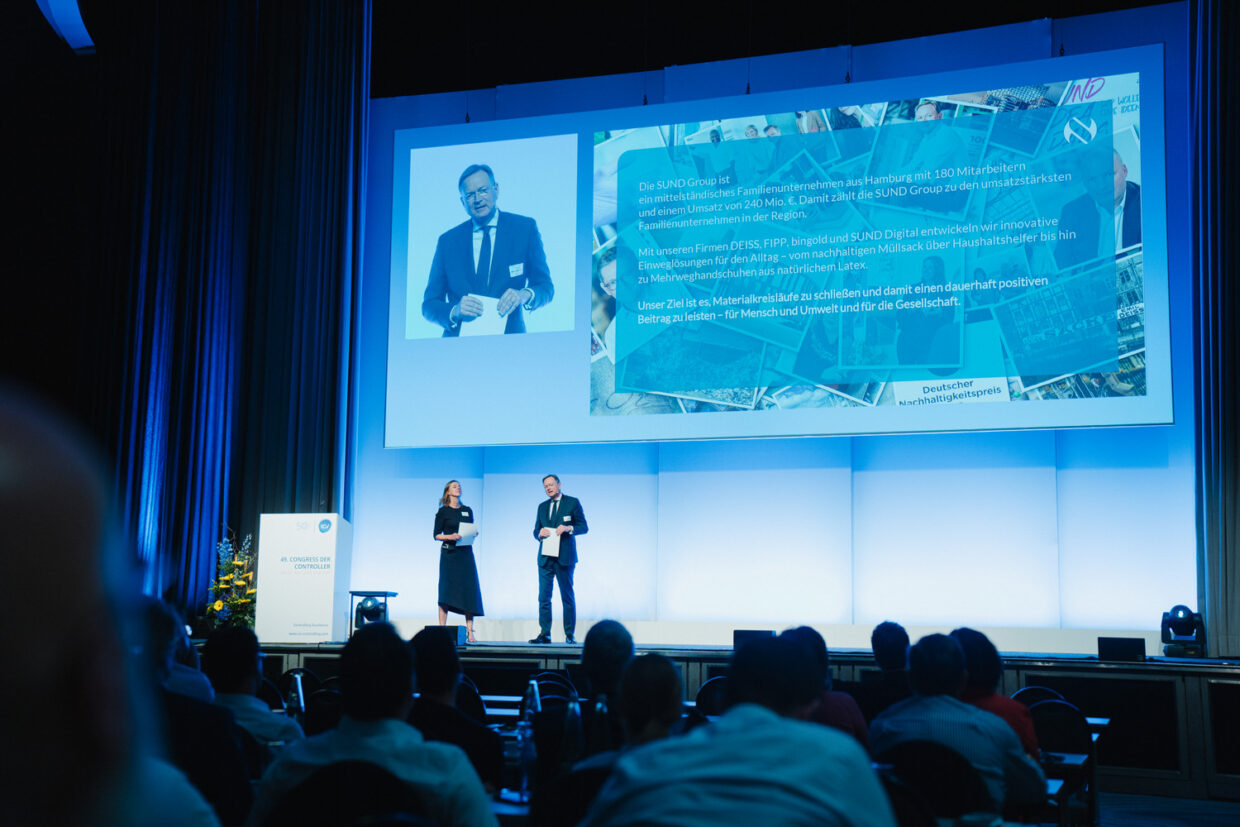
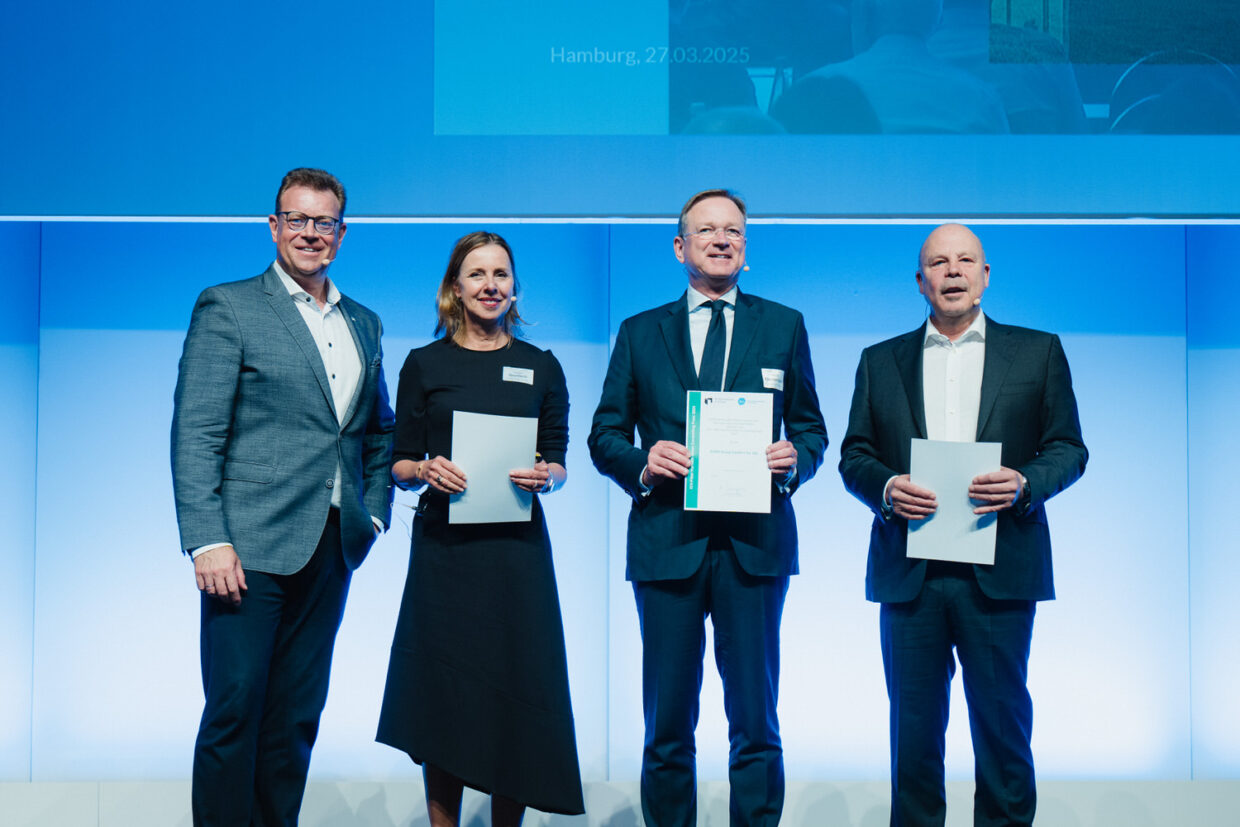
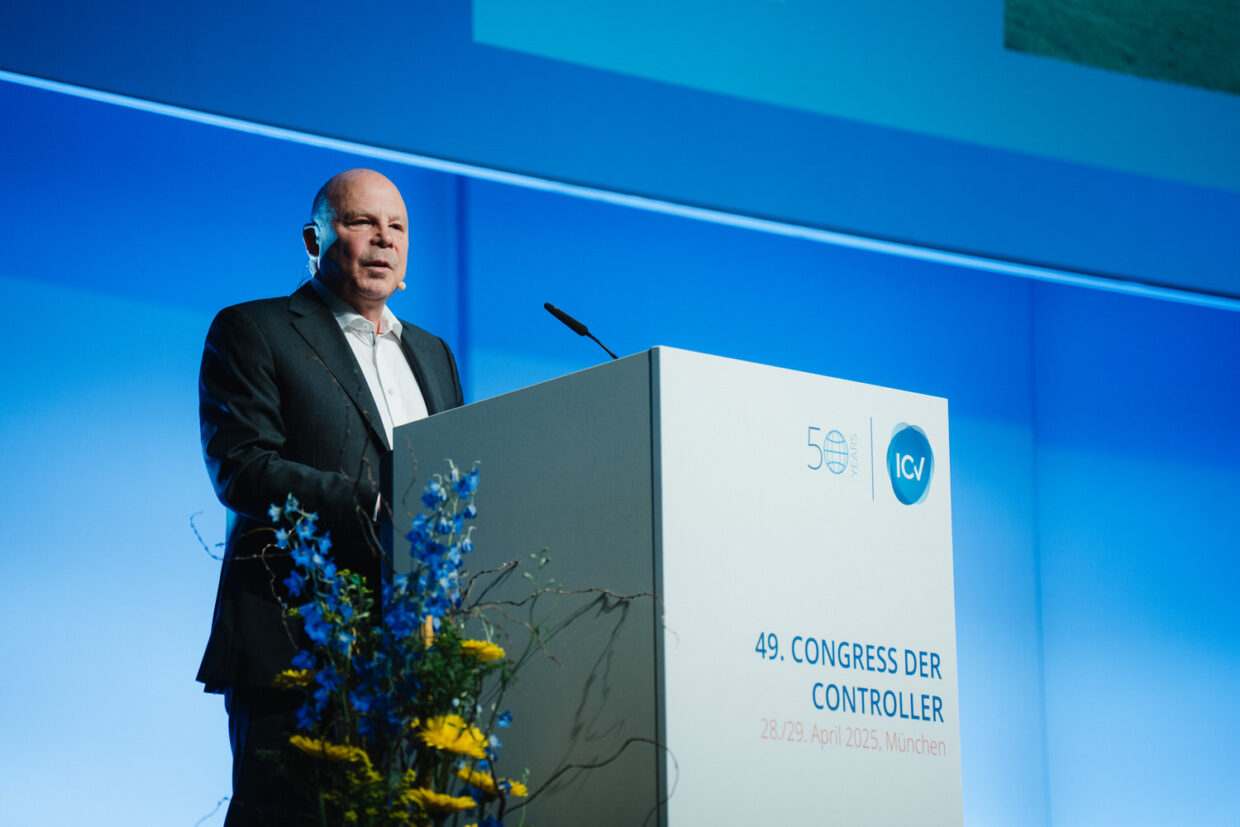

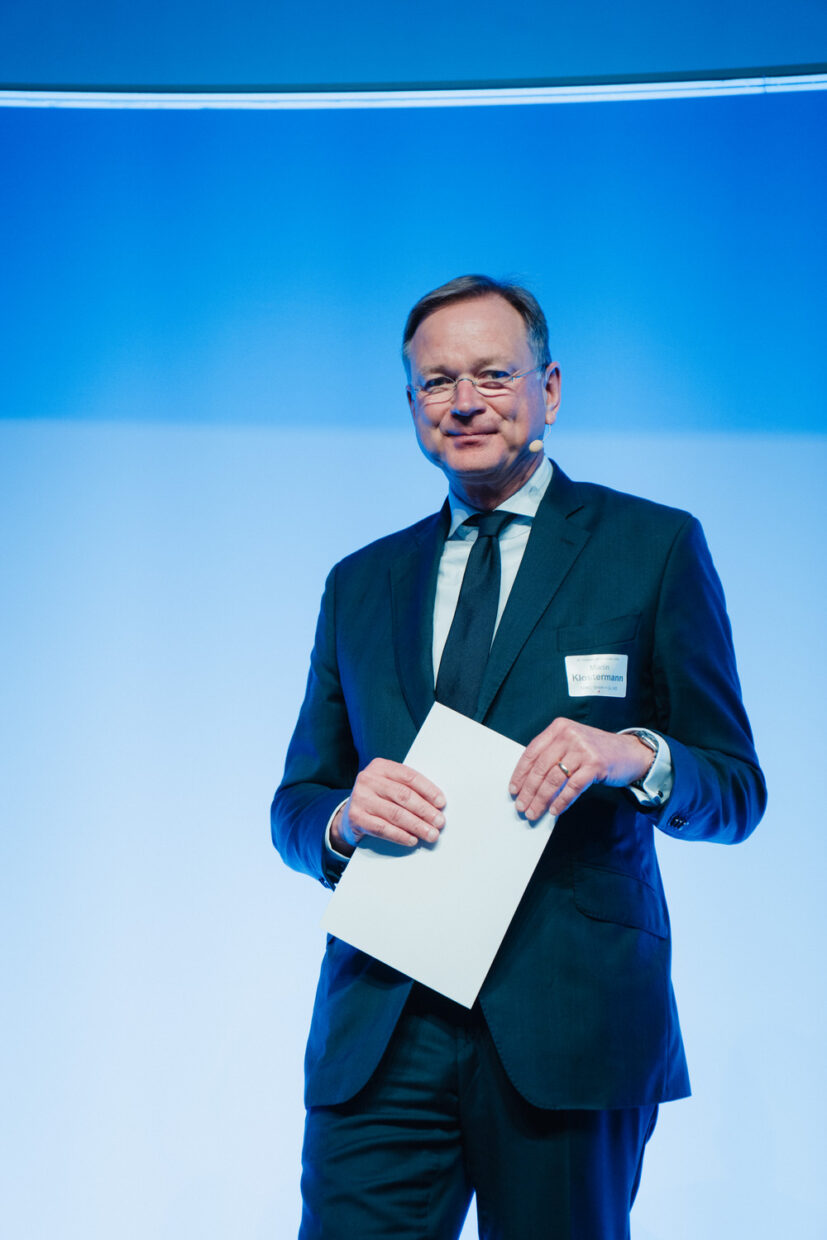
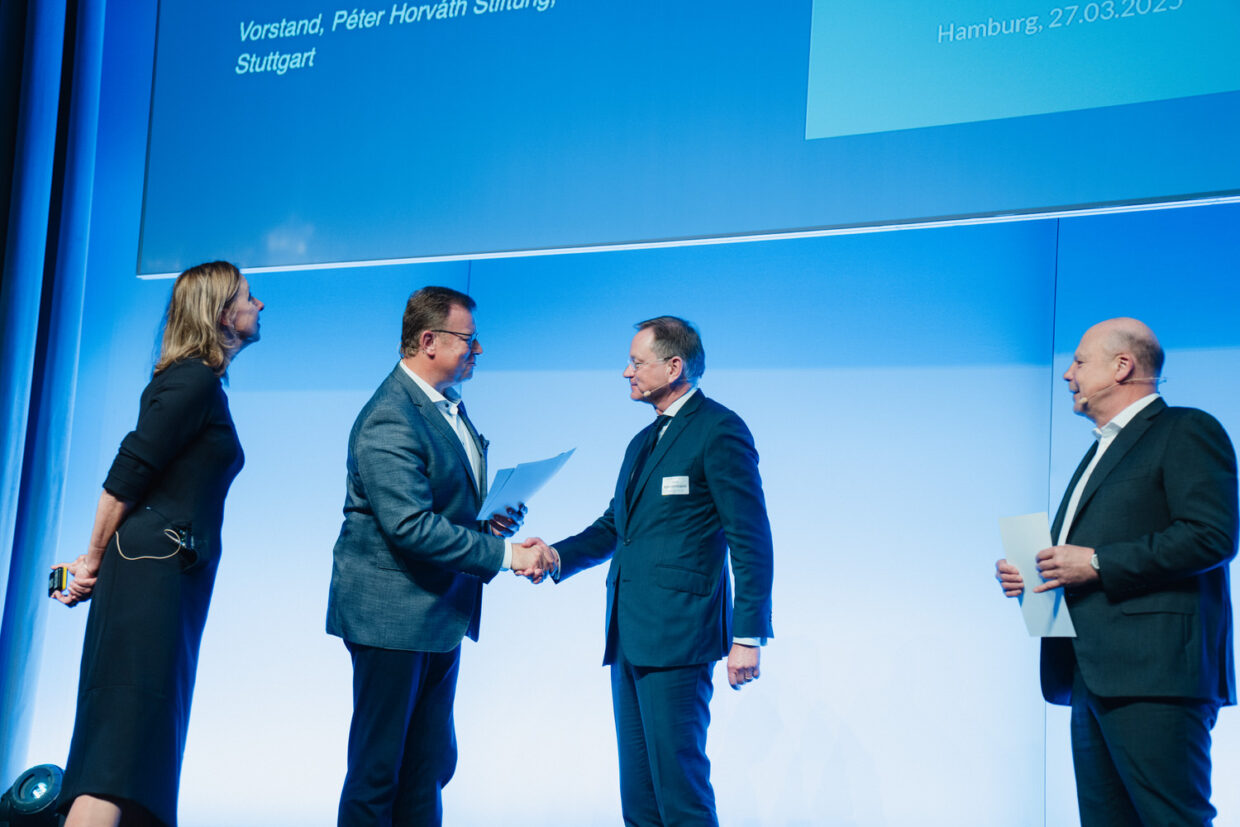

Winning teams
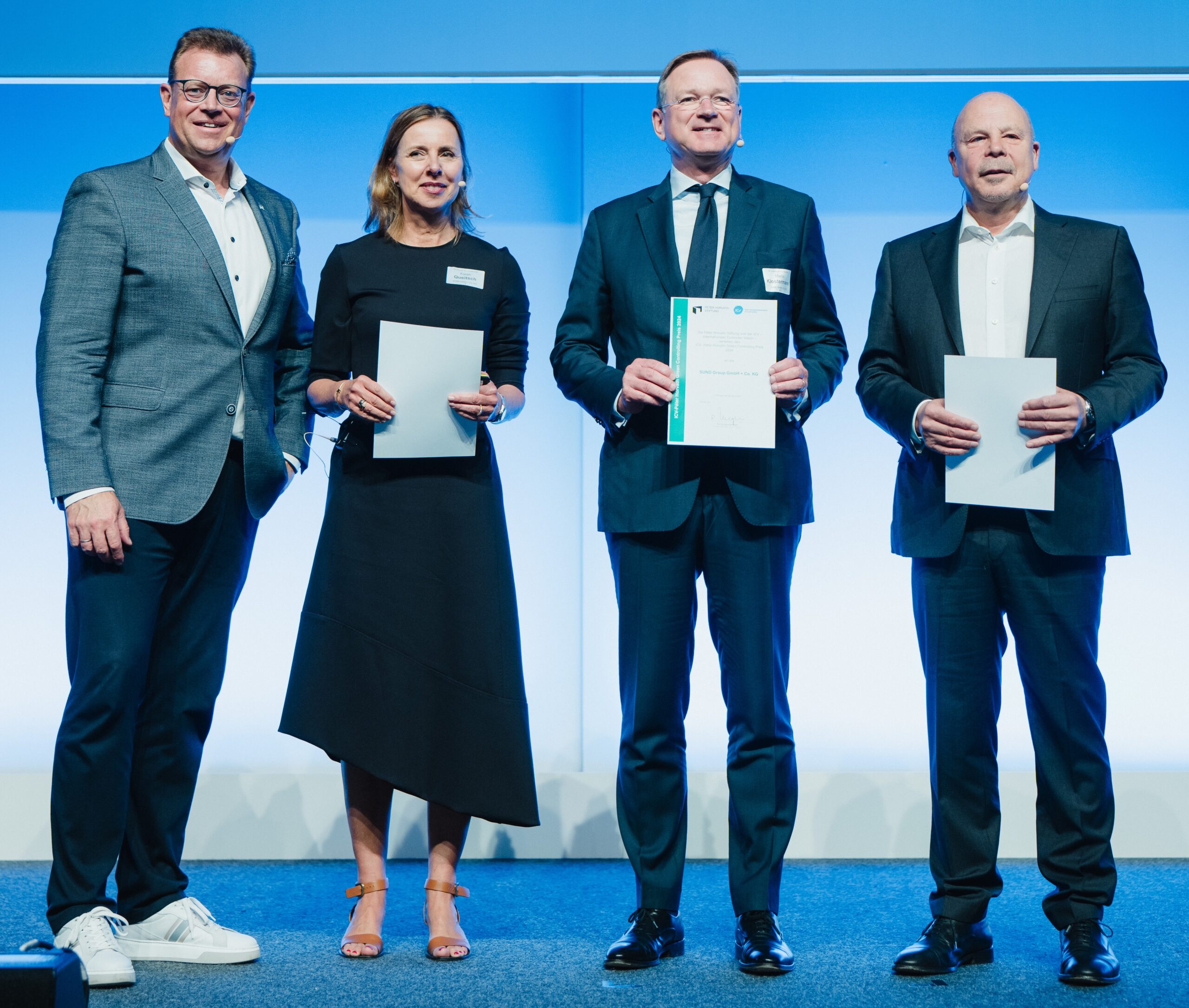 From left: Matthias von Daacke (ICV Chairman of the Board) with the SUND Group award winners Karen Queitsch, Managing Director Sustainability and Innovation, and Martin Klostermann, CEO, together with Prof. Dr. Reinhold Mayer, Chairman of the Péter Horváth Foundation, at the award ceremony on April 29, 2025 at the Congress of Controllers in Munich.
From left: Matthias von Daacke (ICV Chairman of the Board) with the SUND Group award winners Karen Queitsch, Managing Director Sustainability and Innovation, and Martin Klostermann, CEO, together with Prof. Dr. Reinhold Mayer, Chairman of the Péter Horváth Foundation, at the award ceremony on April 29, 2025 at the Congress of Controllers in Munich.
The International Association of Controllers (ICV) and the Péter Horváth Foundation are intensifying their long-standing partnership and are increasingly promoting outstanding achievements in controlling with joint awards. Three established and renowned Awards will be jointly named and awarded with immediate effect: the ICV – Péter Horváth Newcomer Award, the ICV – Péter Horváth Controlling Dissertation Award and the ICV – Péter Horváth Green Controlling Award. The latter was presented to the Hamburg-based SUND Group at the 49th Congress of Controllers of the ICV on April 29, 2025.
ICV – Péter Horváth Green Controlling Award 2025 goes to the SUND Group
“Sustainability is in our DNA,” says the winner of the ICV – Péter Horváth Green Controlling Award 2025 about itself and can prove it: The medium-sized family business from Hamburg established a recycling system for used jute bags back in 1931; bin liners have been produced from recycled polyethylene since the 1970s and today more than three quarters of all SUND Group products are made from recycled or renewable raw materials – and the trend is rising. The aim of the manufacturer of disposable solutions for everyday life – from bin liners to household helpers and reusable gloves – is to close material cycles. “We want to make a lasting positive contribution to people, the environment and society,” says Karen Queitsch, Managing Director Sustainability and Innovation, who, together with CEO Martin Klostermann, will receive the award on April 29 as part of the 49th Congress of Controllers of the ICV.
On site in Munich, they will outline their path to implementing their vision: from the involvement of an external agency to record the current situation to workshops with all employees and stakeholder surveys, from partnerships and certifications to the corporate goals for 2030, when 100% of the SUND Group’s products are to be made from renewable raw materials or recycled materials.
This is to be achieved with product innovations, collaborations, green controlling throughout the company, monitoring of all measures in all departments, monthly monitoring of KPIs and project management exclusively for the implementation of sustainability goals. With the RE:CIRCLE project, the creators from Hamburg also want to raise awareness of sustainability, waste avoidance and recycling among young people.
“The course has been set,” says Martin Klostermann, confident that the plans will be realized, especially as a family business “our name stands for our responsibility”. Winning the ICV – Péter Horváth Green Controlling Award confirms that he and his team are on the right track.
In addition to sustainability, the focus is on research and promoting young talent
Further cooperation awards from the ICV and the Péter Horváth Foundation are dedicated to young talent in controlling and research. The ICV – Péter Horváth Newcomer Award honors outstanding theses by students and promotes young academics. The ICV – Péter Horváth Dissertation Award recognizes excellent academic work in the field of management accounting. Both will be awarded on October 18, 2025 at the ICV’s North-East Conference in Berlin.
The awards will deepen the proven cooperation between the two organizations and keep the name of Péter Horváth alive in the controller community.
The Péter Horváth Foundation is providing a total of 32,000 euros in prize money and funding for cooperation in the area of these awards.
Long-standing partnership for excellence in controlling is strengthened
The connection between the ICV and the foundation’s namesake, Prof. Dr. Dr. h.c. mult. Péter Horváth, who died in 2022, goes back a long way. As one of the founding fathers of modern controlling in Germany, he played a key role in shaping the field. Péter Horváth was awarded honorary membership in 2013 for his outstanding commitment to management accounting and as an active ICV member, for example as the long-standing head of the Ideenwerkstatt think tank.
Joint commitment to the controlling community
With around 6,000 members and 260 company memberships, the ICV is the largest professionally organized network for controllers in Europe. For 50 years, the association has been committed to the practical transfer of knowledge and the further development of controlling.
The Péter Horváth Foundation has been supporting academic excellence and young talent in the fields of business, art and culture since 2002. “These awards keep the legacy of Péter Horváth alive and at the same time promote the future of controlling,” emphasizes Prof. Dr. Reinhold Mayer, Chairman of the Péter Horváth Foundation. “Together, we want to motivate controllers at all career levels to engage intensively with the challenges and potential of our field.”
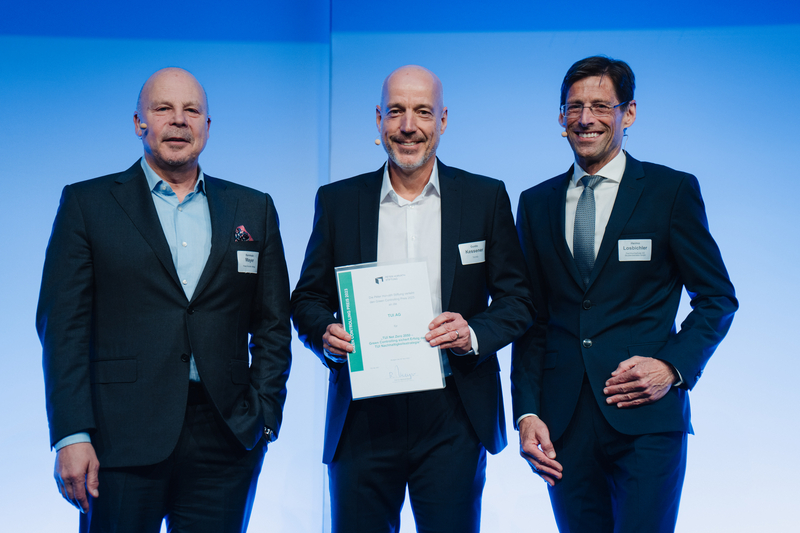
From left: Prof. Dr. Reinhold Mayer, Chairman of the Péter Horváth Foundation with the Award winner Guido Kessener, Head of Group Reporting TUI Group, and Prof. Dr. Heimo Losbichler, Chairman of the ICV Board.
With Green Controlling under the title “TUI Net Zero 2050”, TUI Group ensures the success of TUI’s sustainability strategy, which it considers, together with digitalization, to be the basis for profitable growth.
rdThe international tourism group based in Hanover received the Green Controlling Award 2023 for this. The Award was presented at the ICV Congress of Controllers in Munich on April 30, 2024. The Green Controlling Award, which is endowed with 10,000 euros, is presented annually by the Péter Horváth Foundation in cooperation with the International Association of Controllers. Guido Kessener, Head of Group Reporting at TUI Group, accepted the Award on behalf of his project team with Kathrin Möller (Group Director Sustainability & ESG), Frieder Olfe (Head of Technology / Sustainability) and Dr. Susanne Gauglitz (CFO Central Region).

ICV Chairman of the Board Prof. Dr. Heimo Losbichler, Maria Busch and Christin Sauer (Heraeus Precious Metals) and Prof. Dr. Reinhold Mayer (Péter Horváth Foundation) (from left to right)
Stuttgart/Wörthsee, September 20, 2022. The path toCO2 neutrality begins in the area of finance. With the winning project “Combining Planet & Profit” of the Green Controlling Award 2022, Heraeus Precious Metals is demonstrating an exemplary transformation path. It begins in Controlling, extends to the entire business unit and later, according to the goal, to the entire industry. “This holistic solution is a model solution in many respects,” said laudator Prof. Dr. Heimo Losbichler, ICV Chairman of the Board, in recognition of the project at the award ceremony in Stuttgart on September 20. The Green Controlling Award, endowed with 10,000 euros, is awarded annually by the Péter Horváth Foundation in cooperation with the International Association of Controllers.
The Heraeus Group is one of the world’s leading family-owned technology groups. The roots of the company go back to a family pharmacy founded in 1660. Today, the Group includes companies in the fields of environment, electronics, healthcare and industrial applications. The now award-winning Heraeus Precious Metals business unit is a global leader in precious metal services and products as well as in the trading of precious metals for industrial use. All activities in the precious metals cycle, from trading to precious metals production and recycling, are bundled in this business unit.
The goal is firmly in sight: “We as Heraeus Precious Metals have a concrete plan for how we will do our part to protect our planet. Our products actively contribute to reducing emissions. At the same time, we also want to make a contribution to our planet with the way we manufacture our products. Our goals and ambitions go far beyond the legal requirements,” emphasize Maria Busch and Christin Sauer. The comprehensive project is being driven forward under their leadership. Maria Busch is Head of Global Controlling, Reporting & Projects; Christin Sauer is Global Business Controller of Heraeus Precious Metals at the Heraeus Holding headquarters in Hanau, Hesse. Their stated aim is to transform the metals industry and its use of precious resources. The path to achieving this begins within the company with consistent measurement and tracking of the ambitious goals through controlling.
Fossil fuels will be taboo from 2033
Starting from the base year 2019, electricity is to be sourced entirely from renewable energy sources worldwide by 2025 and the efficiency of the energy used is to be increased by 20 percent – also by identifying and avoiding unnecessary consumption. Heraeus Precious Metals is also aiming for completely
This defines the starting line and the finish line. Unlike many other companies that have also set out on the path to aCO2-free footprint, the starting point of the transformation is in the area of finance. This is where the forward-looking project is set up and the foundation for all further measures is laid. On the basis of the currentCO2 footprint management and cost center reports are prepared,CO2 targets are defined in management scorecards and theCO2 footprint is taken into account for upcoming investment decisions and budget processes. In the second stage of development, this process is rolled out across the entire organization with target setting agreements, review meetings and production inspections, until the “green company transformation” is finally achieved in stage 3. The transformation is accompanied by a revision of the previous corporate strategy – the existing business model is put to the test. Suppliers are also included in the development. Heraeus Precious Metals has no less a goal than to set new standards for its industrial sector.
Four pillars provide orientation along the project path
Heraeus Precious Metals has identified four supporting pillars for implementation, the stability of which must be ensured in order to achieve the project goal. Under the motto “Shaping the way we work to combine planet and profit”, the areas of transparency & roadmap, cultural transformation, carbon-reducing activities and business models & customers are always firmly in focus. Controllers can make a significant contribution to success by making investment decisions, setting scientifically sound targets and continuously evaluating the product portfolio with regard to thecarbon footprint. QLIK reports make relevant data available throughout the organization up to cost center level. The biggestCO2 drivers are identified in the budgeting process and the reduction in carbon emissions is transferred to all locations and business units as part of the management target agreements in line with the EBT targets.
Three key points were decisive in the decision to select Heraeus Precious Metals as the winner of the Green Controlling Award 2022, says Prof. Dr. Heimo Losbichler. On the one hand, it is remarkable that the project was not a reaction to the requirements of the capital market, but was created “out of our own conviction”. In addition, the controlling team offers a holistic solution – from strategy to operational reporting, from the service creation process to the products. The entire value chain up to Scope 3 was designed and a comprehensive application was ensured throughout the entire Group. It is impressive that the focus was not only onCO2, but also on GHG. “The project also demonstrates the ideal case of modern controlling: the solution creates transparency based on a clear current status and clear targets. The role of controlling here is active business partnering,” says the ICV CEO enthusiastically.
Plus points for the image are welcome side effects
For the winner of the Green Controlling Award 2022, the economic impact of these measures is more than desirable. In addition to the “investor push” for investors who pay attention to sustainability-based KPIs and the “customer pull” for customers who value end-to-end sustainability along the supply chain, Heraeus Precious Metals is also increasing its attractiveness as an employer with the award-winning project and fulfilling the legal requirements, such as for the Green Deal, CBAM and CSRD. The company is also consciously assuming the role of “leader” in its own industrial sector. On its own path toCO2 neutrality by 2025, high standards are defined, including for the recycling rate, in order to influence and motivate other companies.
For the first time since the Green Controlling Award was first given in 2011, its initiator and traditional laudator was absent. Péter Horváth passed away in June of this year at the age of 85, taking everyone by surprise. At the Stuttgart Controlling & Management Forum, where the Award is presented every year, the charismatic “Pope of Controlling”, who was extremely active in the field for decades, was also remembered once again.

The Péter Horváth Foundation and the International Association of Controllers (ICV) have jointly presented the Green Controlling Award for the best practical solution on the subject of controlling and sustainability. This year’s award went to BASF. The chemical company was recognized for its method for calculating the product-related CO2 footprint. BASF can now use the digital “Strategic CO2 Transparency Tool” (SCOTT) to calculate the CO2 footprint for all 45,000 or so products in its own portfolio. In this way, the Ludwigshafen-based company creates transparency and enables fine-tuned control options to avoid even more emissions in the future.
“We are proud of the Green Controlling Award – a great accolade for the entire project team. It encourages us to continue on our path of making our expertise and digital solution available to other market players via an ecosystem of partnerships,” says Jochen Kurtz, Vice President Group Performance Management & Analytics.
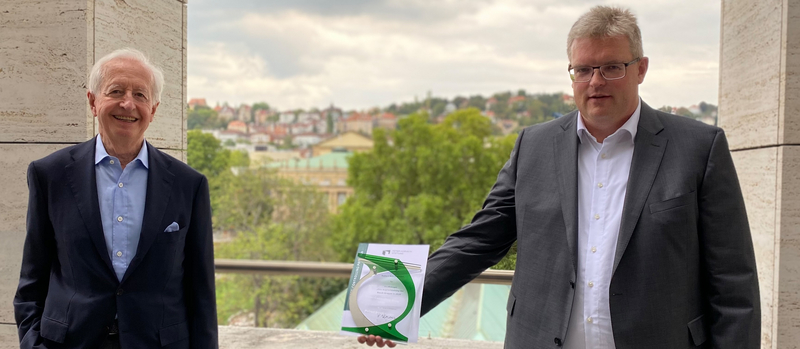
The 2020 Green Controlling Award of the Péter Horváth Foundation in cooperation with the ICV International Association of Controllers goes to Robert Bosch GmbH for the project “CO2 neutrality of the Bosch Group in 2020”.
By the end of 2020, Bosch will be the first global industrial company with more than 400 locations to be CO2-neutral. An interdisciplinary team of controllers, engineers, energy and climate experts has developed and launched an ambitious program with various levers. In order to achieve CO2 neutrality, Bosch is investing not only in renewable energy supplies but also in the energy efficiency of its own locations. By 2030, the company aims to gradually improve the ecological quality of its CO2 neutrality by increasing these two measures. As a short-term lever, Bosch also purchases green electricity and fully offsets unavoidable CO2 emissions through selected climate protection measures.
Torsten Kallweit, Head of Environment and Sustainability at Robert Bosch GmbH, received the Green Controlling Award 2020, endowed with EUR 10,000, from Péter Horváth and ICV Chairman Heimo Losbichler on September 23 at the Stuttgart Controlling & Management Forum for the project “CO2 Neutralization of the Bosch Group in 2020”. Kallweit presented the solution to the 500 participants at the online forum.
“Lighthouse project” and “model example”
The prestigious Award has been presented annually since 2011 for the “most innovative and effective green controlling solution”. As business partners to management, controllers are required to actively support the implementation of sustainability goals. Péter Horváth describes the Award-winning solution as a “lighthouse project”: “The fact that Bosch aims to be climate-neutral with its more than 400 locations by the end of 2020 is not just an announcement. With the active involvement of the controlling department in the spirit of ‘Plan, Do, Check, Act’, a detailed implementation plan has been drawn up and is being implemented in a targeted manner.”
“The focus of controllers, managers and the media is understandably on overcoming the coronavirus crisis. However, this should not obscure the fact that the climate crisis is the greater threat in the long term,” explains Heimo Losbichler. “Controllers play a major role in balancing the goals of economy and ecology. The Bosch Group’s project to become CO2-neutral is a prime example of how both targets can be pursued and managed.”
This is the second time since 2016 that Robert Bosch GmbH has been given the prestigious Green Controlling Award. Between 2007 and 2018, the Bosch Group almost doubled in terms of sales and associates – while the company’s absolute CO2 emissions remained almost constant. The increase in CO2 emissions associated with this growth was offset by increasing energy efficiency. The green controlling solution, “Development of a system for strategic and operational environmental controlling”, which won an award in 2016, contributed to this. At that time, energy-saving measures were managed with the help of corresponding relative key figures. From 2007 to 2018, more than 30% of CO2 per million euros of value added was saved. “That was a huge step. But we have not yet been able to reduce absolute emissions,” explains Torsten Kallweit.
Energy efficiency and cost-effectiveness
When developing the now Award-winning project “CO2 neutrality of the Bosch Group in 2020”, the interdisciplinary team had to answer key questions: “What is the maximum amount of energy we can save under economic conditions?”, “How much renewable energy can we generate ourselves?”, “Where and at what price is green electricity available worldwide?” and “Is there a business case for climate neutrality?”. This showed that Bosch can increase its energy efficiency by around 20% – while meeting the company’s profitability criteria. In order to leverage this efficiency potential, investments of EUR 1 billion are required by 2030. This could save around EUR 1 billion in energy costs over the same period. This business case convinced the management.
To ensure efficiency and acceptance, existing processes and reporting lines are used to implement the four levers. Each business unit is given an annual absolute energy savings target, the achievement of which is regularly reviewed. A controlling cycle based on “Plan, Do, Check, Act” has been introduced to manage CO2 neutrality.
The implementation of the measures is checked by means of monthly reporting in a central database at site level. For example, each location enters the amount of energy consumed in the monthly period and uses measured values and invoices to prove that this comes from its own renewable energy supply or the purchase of green electricity or gas. CO2 emissions from combustion processes are calculated in a standardized manner and offset by calling up compensation certificates from the global framework agreement. The monthly reports of the locations are checked in a two-stage validation process by the business division and regional organization. The management teams from Group to site level receive monthly information on the status of target achievement and initiate measures if necessary. As the results of the audit are also included in the Group management report, the process, data, evidence and target achievement are reviewed by an auditor in close coordination with the Controlling and Finance departments.
Role of controllers in design, implementation and application
“Such an ambitious, complex program was only possible thanks to the intensive partnership and collaboration of an interdisciplinary team of controllers, engineers, energy and climate experts,” explains Torsten Kallweit. “It was the interaction between the different areas of expertise and experience as well as the willingness to learn from each other that made the design, implementation and application possible.” During the design phase, the controllers contributed their expertise, particularly in defining the control parameters and the business case for the neutral position – from the evaluation of individual projects to the overall concept. The interdisciplinary team supported the controllers during implementation. Finally, the application benefits from the experience of the controllers in areas such as the controlling cycle and the mapping of the “Plan, Do, Check, Act” process.
Bosch was already able to reduce its CO2 emissions (Scope 1 & 2) from 3.26 million to 1.94 million tons in 2019. At the annual press conference in April 2020, the company announced that it was already 70% CO2-neutral and held out the prospect of achieving CO2 neutrality by the end of the year.
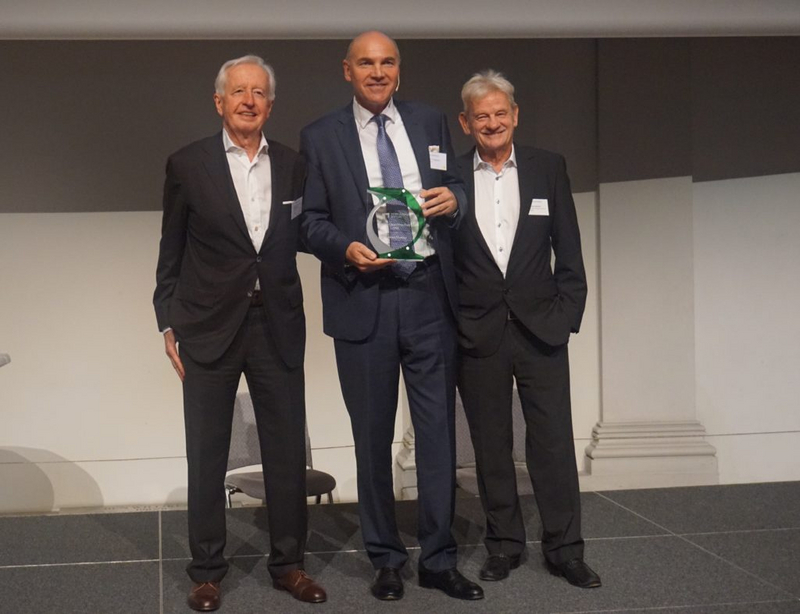
Presentation of the Péter Horváth Foundation’s Green Controlling Award 2019 together with the ICV on October 10 at the 33rd Stuttgart Controlling & Management Forum (from left to right): Prof. Dr. Dr. h. c. mult. Péter Horváth, Dr. Peter Kollmann, CFO VERBUND AG, Siegfried Gänßlen, ICV Board Member.
The prestigious Green Controlling Award of the Péter Horváth Foundation, which is awarded annually together with the ICV (International Association of Controllers), went to VERBUND AG in Vienna in 2019 for its “Green Finance” program.
VERBUND AG’s finance division makes a significant contribution to sustainability. The award winner is Austria’s leading electricity company and one of the largest producers of electricity from hydropower in Europe. VERBUND’s investment program comprises exclusively sustainable projects in the areas of hydropower, new renewables and the high-voltage grid (integration of new renewables into the European electricity system).
VERBUND has taken on a leading role in green finance both nationally and globally. The numerous successful transactions carried out by VERBUND include, in particular, the world’s first ESG-linked syndicated loan and the first digital green Schuldschein as well as green bonds and the sustainable investment of funds for social capital.
Prof. Dr. Dr. h. c. mult. Péter Horváth explains: “Our Jury has come to the conclusion that VERBUND AG is an innovative pioneer in ‘green’ financing and a benchmark for the entire economy. This makes it a worthy winner of the Green Controlling Award; a role model for the design and management of ecological strategies, programs, projects and measures in companies and public institutions.”
“VERBUND has focused on innovation and leadership in green finance from an early stage,” says Dr. Peter Kollmann, CFO of VERBUND AG. “We are particularly pleased that our efforts and successes have been recognized by this Award and that the Jury has highlighted our international role model. This strategic focus is a clear signal to the financial market with positive effects on investor acceptance, rating agencies and financing costs.”
In his short speech, ICV Board Member Siegfried Gänßlen began by thanking all those who submitted entries, including those who did not receive an Award. Once again this year, controllers proved to be innovative and responsible in the competition.
The Péter Horváth Foundation’s 2019 Green Controlling Award, endowed with EUR 10,000, was presented to Dr. Peter Kollmann, CFO of VERBUND AG, by Péter Horváth and Siegfried Gänßlen at the 33rd Stuttgart Controlling and Management Forum on October 10. In his gripping presentation, the Award winner not only introduced the “Green Finance” program of VERBUND AG. He pointed out the fundamental importance of ecological action in a compelling and convincing manner.

Green Controlling Award Ceremony 2018: Dr. Ali Arnaout (center), AIDA Cruises, accepted the Award from Prof. Dr. Dr. h.c. mult. Péter Horváth (left), Deputy Chairman of the Supervisory Board of Horváth AG, and Siegfried Gänßlen (right), ICV Board Member. (Image: obs/AIDA Cruises)
On September 19, the Péter Horváth Foundation in cooperation with the International Association of Controllers (ICV) presented the 2018 Green Controlling Award at the 32nd Stuttgart Controlling and Management Forum. The winner is AIDA Cruises with the “Green Cruising” project. Dr. Ali Arnaout, Senior Vice President & CFO AIDA Cruises and CIO Costa Group, accepted the award from Prof. Dr. Dr. h.c. mult. Péter Horváth, Deputy Chairman of the Supervisory Board of Horváth AG, and Siegfried Gänßlen, ICV Board Member.
In his lecture, Dr. Arnaout presented the innovative approaches that AIDA Cruises is pursuing in order to reflect the “green cruising” strategy as an elementary component of corporate planning and management. “For AIDA Cruises, ecology and economy are not a contradiction in terms,” said Dr. Arnaout. “Due to the long-standing strategic importance of sustainability for AIDA Cruises, ‘Green Controlling’ is an integral part of corporate planning and management. What is innovative is that we anchor the goals of green cruising at all planning levels as part of strategic and operational corporate planning and consistently map ecological and economic target relationships in business management.” He continues: “We need to assess the contribution of our sustainability goals, evaluate the risks and answer the question of what budget needs to be allocated appropriately and acceptably to achieve sustainability. This is about managing the portfolio – and doing so in the face of constantly changing requirements and regulations,” says Dr. Arnaout.
“Economic efficiency of the technology of the future”
Jury Chairman Prof. Dr. Dr. h.c. mult. Péter Horváth pointed out in his laudatory speech that “shipping has been the focus of criticism for years”. A major upheaval is looming in environmental technology: from 2020, for example, marine diesel will have replaced heavy fuel oil, which is harmful to the environment, and exhaust gas purification is a current topic on the agenda.
Agenda and “some cruise companies are considering liquefied natural gas as an alternative fuel”. AIDA Cruises is one of those companies that “started looking into the use of liquefied natural gas years ago and now, two months ago, put the first cruise ship powered entirely by liquefied natural gas, the ‘AIDAnova’, into operation.”
“When you consider that such an innovative ship was commissioned more than ten years ago, it also has a lot to do with controlling,” says Prof. Horváth. “The planning of such a ship is proof of a corporate strategy that integrates economic, ecological and social objectives in an exemplary manner. The basis for this is a controlling system that coordinates, measures, controls and monitors all of the company’s activities, including the sustainability program. This is why this year’s Green Controlling Award goes to AIDA Cruises for the business management implementation of the ‘Green Cruising’ strategy.”
He described the AIDA Cruises controlling system as a holistic approach that integrates the three target dimensions in an exemplary manner at all planning and management levels with the active involvement of the controller. The interaction between the business areas such as administration and the marine operations units is realized across all planning levels, “supported by a set of new, innovatively designed key figures”. “The sustainability program with a large number of individual projects of a very long-term nature is coordinated company-wide and approved by Controlling. Controlling has designed and implemented the commercial planning and management of the ‘new technical territory of liquefied natural gas operations’ and tracks the profitability of the technology of the future.”
Decision-making basis for green projects
ICV Board Member Siegfried Gänßlen explained: “Controllers often have the difficult task of freeing up money for green controlling in their companies. Because here, as everywhere else, the same applies: ‘No moss, no green’. For controllers, this means ensuring a balance in which profits are not lost sight of and money always remains in the coffers – and all this with the often extremely long lead times of sustainability projects. The controllers therefore make a very important contribution in this area, ensure the necessary balance, enable the right prioritization and, as business partners, create the basis for decision-making so that the management ultimately stands behind the green projects.”
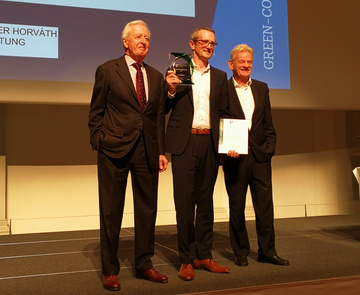
Award ceremony (from left to right): Prof. Dr. Dr. h.c. mult. Péter Horváth, Chairman of the Jury; Richard Mager, Head of Product Controlling at Dr. Ing. h.c. F. Porsche AG; Siegfried Gänßlen, ICV Chairman.
The Green Controlling Award 2017 of the Péter Horváth Foundation together with the International Association of Controllers (ICV) was awarded on September 20, 2017 in Stuttgart for the solution “Business management of CO2 target achievement at Porsche”.
Richard Mager, Head of Product Controlling at Dr. Ing. h.c. F. Porsche AG, accepted the EUR 10,000 prize from Prof. Dr. Dr. h.c. mult. Péter Horváth and Siegfried Gänßlen, Chairman of the ICV Board. He then presented the Award-winning solution to the plenary session of the 31st Stuttgart Controlling & Management Forum.
In his laudatory speech, Prof. Horváth explained that since 2011, the Green Controlling Award has been awarded annually to solutions in which controller teams have made a demonstrable and exemplary contribution to “making a profit with green issues”. The 2017 Award-winning solution “is the core of a strategy-oriented overall system to support management on the way to becoming a ‘green company’”, says Professor Horváth. “There is a comprehensive set of tools and KPIs for management. In other words, ecology-oriented planning, reporting and control are effective at all levels of the company.” At Porsche, there are also clear controller tasks for the implementation, maintenance and further development of the system: this has been rolled out company-wide and further development is clearly defined with a roadmap.
Richard Mager, Head of Product Controlling at Porsche, presented the Award-winning green controlling solution. He derived the Controller’s commitment to this topic from the Porsche Strategy 2025, in whose central objectives the topic of sustainability is firmly anchored. He also referred to the increasing number of markets worldwide with regulations for fleet emissions. According to Mager, in addition to the implemented and planned consumption optimizations, further measures will be necessary to achieve future CO2 targets.
Mager provided insights into how the business management of CO2 target achievement takes place at Porsche in corporate planning on the one hand and in vehicle project management on the other. Corporate planning is primarily concerned with taking CO2 effects and measures into account at an early stage and evaluating identified gaps in CO2 target achievement. The aim is to create a financial reserve in corporate planning – even for measures that are not yet known. This CO2 reserve is assessed based on the value approach and taken into account in the cash view and earnings planning with typical annual distributions.
In vehicle project management, the costs required to achieve project-specific CO2 targets – in addition to other targets (“integrated target system”) – are taken into account in the target catalog of the vehicle project. In the project status, the impact on results due to exceeding or falling short of CO2 targets is evaluated. A standardized CO2 indicator supports the business prioritization of possible CO2 measures.
“Green controlling has not stopped at ‘green’”
The International Association of Controllers (ICV) and Horváth & Partners work together in the ICV Think Tank. The first topic of this cooperation in 2010 was “Green Controlling”, which is continuously being worked on within the ICV. “Green controlling has not stopped at ‘green’, but has evolved into sustainability controlling, sustainable corporate management and corporate social responsibility (CSR),” says ICV Chairman Siegfried Gänßlen. “The starting point for the success of sustainability is anchoring it in the corporate strategy and implementing it in day-to-day business. This is a multi-stage process that requires a clear direction, patience and commitment.”
As business partners to management, controllers are required to actively support their companies in both the development and implementation of sustainability goals. The topic of sustainability has matured in corporate management in recent years. Today, the focus is on economic benefits, combined with social responsibility and the fulfillment of legal obligations. However, as controlling is often still only marginally involved in the implementation of social and ecological corporate goals, green controlling solutions from the field are important in providing guidance to the controller community. To this end, the Péter Horváth Foundation has been awarding the Green Controlling Award together with the ICV since 2011.
On behalf of Porsche’s 2017 Green Controlling Award-winning team, Richard Mager announced that the prize money of EUR 10,000 would be donated to the Helmholtz Center for Environmental Research in Leipzig.
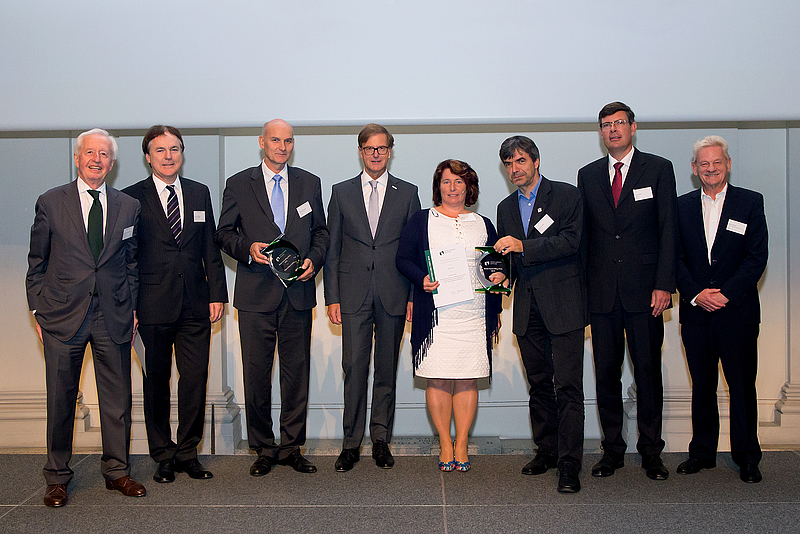
The Green Controlling Award winners 2016 and the Jury members (among others): Claudia Maron (4th from right), Head of Business Administration at DATEV eG; Dr. Stefan Asenkerschbaumer (4th from left), Deputy Chairman of the Board of Management of Robert Bosch GmbH, responsible for Purchasing and IT as well as the central functions of Business Administration, Finance and Accounting, Planning and Controlling, Internal Accounting and Organization; founder and jury chairman Prof. Dr. Dr. h.c. mult. Péter Horváth (left); Siegfried Gänßlen (right), Chairman of the International Association of Controllers (ICV). Image source: www.konferenzfotografie.de
On Wednesday (21.09.2016) in Stuttgart, founder Prof. Dr. Dr. h.c. mult. Péter Horváth and ICV Chairman of the Board Siegfried Gänßlen presented the Green Controlling Award. It goes to Robert Bosch GmbH for the “Development of a system for strategic and operational environmental controlling” and to DATEV eG for the “Sustainability check – management tool for anchoring sustainability in corporate management”. Every year, the Péter Horváth Foundation, in cooperation with the International Association of Controllers (ICV), awards the prize for controlling solutions that integrate sustainability aspects into corporate management in an exemplary manner.
Controllers as management’s “green” business partners
In 2016, the Green Controlling Award went to both a large and a medium-sized company. Under the title “Development of a system for strategic and operational environmental controlling”, Robert Bosch GmbH developed and introduced an integrated overall controlling system that was anchored in all business processes (from corporate development to management and support through to value creation). Controlling ensures that economy and ecology are brought into balance, both strategically and operationally. “The BOSCH solution shows in an exemplary way how the topic of ecology spans all functions and all hierarchical levels of the Group worldwide. In particular, the active role of the controller as a ‘green’ business partner becomes clear,” explains Péter Horváth.
Another winner of the 2016 Green Controlling Award is DATEV eG from Nuremberg. As a large medium-sized cooperative company, DATEV has firmly anchored sustainable business development in its corporate objectives. The award went to the concept “Sustainability check – management tool for anchoring sustainability in corporate management”. “DATEV’s integrative approach is also exemplary and best practice,” explains Horváth. “The topic of sustainability is comprehensively integrated into both the organizational structure and the business processes. Controlling reflects sustainability in its figures. Operational implementation and management is carried out using a clearly defined set of key figures. All decisions made by the Management Board must also be evaluated from a sustainability perspective.”
“Exemplary solutions provide orientation for the controller community”
“As business partners to management, controllers are required to actively support their companies in both the development and implementation of sustainability goals,” explains ICV Chairman Siegfried Gänßlen. “The topic of sustainability has matured in corporate management in recent years. This was shown by the International Association of Controllers’ Green Controlling Study 2016. Compared to 2010, the focus today is on economic benefits, combined with social responsibility and the fulfillment of legal obligations.” However, controlling is often not or only very little involved in the implementation of social and ecological corporate goals. “This makes green controlling solutions from the field that provide guidance to the controller community all the more important,” says Gänßlen. “The 2016 Award winners have succeeded in doing this in exemplary fashion.”
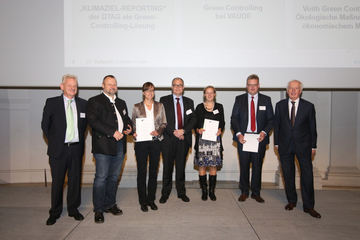
The 2015 Green Controlling Award winners (from left to right): Siegfried Gänßlen, ICV Chairman; Erwin Gutensohn, CFO Vaude; Isabel Stiefenhofer, Controlling Vaude; Dr. Heinz-Gerd Peters, Sustainable Development, Dt. Telekom; Silke Thomas, Sustainable Finance, Dt. Telekom; Torsten Kallweit, Head of Sustainability, Voith GmbH; Prof. Dr. Dr. h.c. mult. Péter Horváth. (Image: www.konferenzfotografie.de)
In 2015, the Green Controlling Award was given to three companies for the first time: Deutsche Telekom AG, VAUDE Sport GmbH & Co KG and Voith GmbH. The Award, which is donated annually by the Péter Horváth Foundation and endowed with EUR 10,000, was increased by EUR 5,000 this year, so that each winner was able to receive EUR 5,000 at the Controlling Forum Stuttgart on September 23. The Award was presented by Péter Horváth, Chairman of the Jury, and Siegfried Gänßlen, Chairman of the International Association of Controllers (ICV).
Every year, the Péter Horváth Foundation, in cooperation with the International Association of Controllers (ICV), awards the Green Controlling Award under the motto “With green topics to black figures!”. To promote controlling’s engagement with the “green challenge”, controllers or controller teams are awarded for the most innovative and effective “green” controlling solution for designing and managing ecological strategies, programs, projects and measures in companies and public institutions.
Deutsche Telekom AG: Green controlling for Group-wide transparency
Deutsche Telekom AG has set itself the Group-wide climate protection target of reducing CO2 emissions by 20% by 2020 compared to 2008 (Deutsche Telekom Group excluding T-Mobile US). So-called “energy clusters” describe the main drivers: increasing efficiency in network infrastructure and data centers; energy management of buildings and IT; climate-friendly alignment of the vehicle fleet and travel activities.
Green controlling is structured in a management control loop in which measures are sharpened and reprioritized or redefined. The SAP system was expanded in 2011 to record ESG data (“Environment, Social, Governance”). The ESG data process was linked to the financial data process. In addition to monitoring the climate protection target, this created the prerequisite for integrating ESG KPIs (key performance indicators) into the annual report. The SAP system also offers a deviation analysis compared to the annual target values.
The green controlling solution enables the Management Board and top management to be informed transparently and promptly about developments and any need for action with regard to climate protection targets. Climate protection monitoring makes it possible to clarify the need for compensatory measures to achieve the climate protection target if required. Overall, the green controlling solution makes a significant contribution to the sustainable reduction of energy costs within the Group and to the reduction of CO2 emissions.
VAUDE: Green controlling integrated into the corporate management process
The sustainably innovative outdoor outfitter VAUDE pursues an integrated sustainability strategy that is implemented in all areas of the company, throughout the entire product life cycle as well as at the climate-neutral company site in Tettnang.
At VAUDE, green controlling is fully integrated into the corporate management process: at all levels and not as a separate system. Operated by an interdisciplinary CSR team and departmental controllers, it supports the triad of economy, ecology and social responsibility. Green controlling is used as a CIP – continuous improvement process – and as a driver of innovation.
Traditional controlling plays a key role in the design, implementation and application of the system. The Controlling department designed and implemented the target system – including the sustainability indicators – together with the Corporate Development department and the management. The key figures for the “green targets” were also developed in close cooperation between Controlling, Corporate Development, the Environmental Officer and the CSR Officer. The Controlling and Corporate Development departments coordinate the measurement, tracking and analysis of green KPIs. They are also involved in the development of investment applications – taking green aspects into account in profitability calculations.
Voith GmbH: Transparency ensures “competitive spirit”
The green controlling established in the Voith Group has brought significant economic and ecological benefits and strengthened the company’s competitiveness. Energy, water and material efficiency measures have generated annual savings of EUR 6.5 million.
The green controlling solution at Voith is characterized by a consistent combination of a top-down and a bottom-up approach: In the top-down approach, overarching Group targets are defined through cross-location analyses, comparisons with other companies and best practices. The bottom-up approach uses site-specific analyses to identify potential measures for achieving the Group’s green goals.
The established controlling cycle was transferred from traditional financial controlling to green controlling. The basis for success is the Group-wide standardized IT implementation of the green controlling process. A high degree of transparency indicates best practices and creates a competitive spirit between the locations.
Encouraging controlling to deal with sustainability
Today, environmental protection is no longer just a cost factor, but the environmentally friendly orientation of the entire company should be seen as a long-term success factor that also opens up new opportunities on the sales market. The green orientation of corporate activities presents controlling with the challenge of green planning, management and control. This requires innovative approaches, methods and ideas in the sense of “green controlling”. Controllers should support the implementation of green goals methodically, instrumentally and in an advisory capacity. Generating transparency with the help of the right key figures, demonstrating profitability and evaluating ecological success as well as integrating green content into all decision-making processes are considered to be essential tasks.
The Green Controlling Award has been presented since 2011. The Jury is headed by Prof. Dr. Dr. h.c. mult. Péter Horváth (Horváth AG, IPRI gGmbH), Head of the ICV Think Tank. The Award winners are: Deutsche Post DHL (2011), Hansgrohe SE (2012), Volkswagen AG (2013), Flughafen Stuttgart GmbH (2013), Takata AG (2014), STABILO International GmbH (2014), Deutsche Telekom AG, VAUDE Sport GmbH & Co. KG and Voith GmbH (all 2015).

Presentation of the Green Controlling Award 2014, from left to right: Dr. Dan Tulvan, Director Manufacturing, Arad (RO), Jürgen Volk, Manager Controlling Steering Wheel EMEA, Jörg Henry Dinkat, Director Controlling Global Steering Wheel & FI/CO Office EMEA – all Takata; Péter Horváth, Jury Chairman; Angelika Henkel, Head of Controlling, Stabilo International, Martin Reim, Managing Director Schwanhäuser Industrie Holding; Lucian Lusca, Manager General Service, Takata Arad (RO); Siegfried Gänßlen, ICV Chairman
At the CCS 2014, the Green Controlling Award 2014 was presented to STABILO International GmbH for the programme “Controlling as a business partner for sustainable corporate management” and to Takata AG for the programme “Maximize innovation to minimize environmental impact”. The EUR 10,000 prize, donated by the Péter Horváth Foundation, was presented by Péter Horváth, Chairman of the Jury and Head of the ICV Think Tank.
The Award winners presented their solutions to over 100 controlling experts and managers in the CCS plenum: Angelika Henkel, Stabilo International GmbH, Heroldsberg, and Jörg Henry Dinkat, Takata AG, Aschaffenburg.
Both Award winners have announced that they will donate their prize money to social causes: Stabilo for a refugee shelter in Höchstadt, Takata AG for a social project in Romania.
STABILO: “Controlling as a business partner for sustainable corporate management”
In order to focus the company’s sustainability initiatives, the management defined specific sustainability targets in 2009 with the “Strategy 2014”. As a business partner to management and the operating units, Controlling was required to integrate the requirements arising from the sustainability targets into daily processes. The green controlling solution has three components: 1. supporting the (further) development of the STABILO sustainability program; 2. creating and reporting transparency on program results; 3. providing process-integrated support for the sustainability program.
The Jury recognized several innovative aspects in the solution concept. Among other things, controlling is integrated as an internal consultant for all processes, while the specialist departments are autonomous in the implementation of their projects. All three dimensions of sustainability – economic, ecological and social – are considered in an integrated manner and transparency is created regarding their interactions. The green controlling solution is integrated into the existing controlling processes as a key pillar of the STABILO sustainability program. The premise was that the controlling of the sustainability program should not lead to any additional or parallel controlling processes. Instead, existing budgeting and reporting processes were expanded to include sustainability targets. Only the controlling of measures, which is used for the ongoing monitoring of sustainability measures, was newly established.
The green controlling solution has helped to promote employee identification with the topic of sustainability. Thanks to the sustainability strategy, the publication of targets and measures and the continuous reporting, employees in all STABILO units feel integrated. In the budget discussions, sales and marketing meetings, there were many good examples that were copied or modified by others. This created a momentum of its own across all units.
Significant successes have been achieved since the start of the sustainability program in 2009. The green controlling solution has also made these successes visible, which contributes significantly to ensuring that sustainability continues to be an essential part of STABILO’s corporate philosophy.
Takata AG: “Maximize innovation to minimize environmental impact”
Takata Corp., headquartered in Tokyo, is a global manufacturer of automotive occupant protection systems (annual sales: EUR 4.1 billion, approx. 45,000 employees worldwide). Takata AG, headquartered in Aschaffenburg, Germany, bundles the European activities.
With the Award-winning green controlling solution, Takata has expanded the classic KPI system with newly developed key figures and a higher level of detail. Green MbOs (Management by Objectives as a global, variable remuneration system for managers) – “Minimize Impact on Environment”, “Limit Potential of ecologic Hazards and Risks”, “Rational materials consumption” – were implemented in the target agreement system. The target agreement system was linked to KPI reporting (Key Performance Indicators).
Takata defines “Green Projects” as all projects that reduce the burden on the environment, save energy or avoid environmental risks. Controlling supports and prioritizes green projects through profitability calculations, data research and results tracking.
The green controlling solution, in which Takata Controlling acts as an innovator and driver as well as a “networker” of the organizational units, uses existing resources and infrastructure in the company. No additional green controlling department has been deliberately set up, but the topic has been integrated into the controlling department with its daily tasks. This also includes the use of the existing reporting structure in SAP. Takata Controlling acts as a moderator and sparring partner, e.g. in discussions with the production departments.
Takata points to a number of positive economic and ecological results regarding the effects of the solution. These include significant cost savings, especially in the area of energy costs: 19% were saved despite a 10% increase in production volume. A heightened awareness and clear responsibilities among the players in the various areas are also cited as successes. In addition, controlling is said to have increased process strength in both day-to-day and project business. The company has experienced a boost in innovation thanks to the prioritized support of “green projects”.

The EUR 10,000 Award donated by the Péter Horváth Foundation was awarded on November 28, 2013 to Flughafen Stuttgart GmbH for the “fairport Controlling” project and to Volkswagen AG for the “Think Blue. Factory.” project. The Award was presented by Prof. Dr. Dr. h.c. mult. Péter Horváth (3rd from right), Managing Director of IPRI gGmbH, Stuttgart, Head of the ICV Think Tank, and Siegfried Gänßlen (photo: left), CEO Hansgrohe SE and Chairman of the ICV Board, to (from left to right): Christoph Nieschwitz and Benjamin Böhnke from Volkswagen AG and to Prof. Dr. Georg Fundel (Managing Director) and Rainer Koch from Flughafen Stuttgart GmbH.
The Green Controlling Award 2013 has been given to Flughafen Stuttgart GmbH and Volkswagen AG. The Award, endowed with EUR 10,000 by the Péter Horváth Foundation, was presented for the third time by the International Association of Controllers (ICV) during the “Controlling Competence Stuttgart – CCS 2013” conference on November 28, 2013 at the IBM Forum in Ehningen near Stuttgart. The solutions honored were “fairport Controlling” (Flughafen Stuttgart GmbH) and environmental controlling as part of “Think Blue. Factory.” (Volkswagen AG).
As “business partners of management”, controllers must ensure that “green issues are in the black” and that there is a balance between the three pillars of sustainability – economic, environmental and social. The controlling community has recognized the importance of the ecological dimension of sustainability for its own work and there are exemplary approaches to developing and introducing environmental management in corporate practice.
Since 2011, the most innovative and effective controlling solutions for the design and implementation of ecologically oriented strategies, programs and projects have been awarded annually. A Jury of ICV experts headed by Prof. Dr. Dr. h.c. mult. Péter Horváth (Horváth AG, IPRI gGmbH, Head of the ICV Think Tank) selects the best integrative solutions that are significantly initiated or co-designed by controllers in companies and public institutions. Prof. Horváth presented the Green Controlling Award 2013 together with ICV Chairman of the Board Siegfried Gänßlen, CEO of Hansgrohe SE.
“fairport Controlling” for managing sustainability performance
The Award-winning “fairport Controlling” is an approach for managing the operational sustainability performance of Flughafen Stuttgart GmbH (FSG). The airport company had developed a fairport code and formulated its sustainability goals in it. FSG integrates these into its strategic and operational planning, management and control, investment accounting and internal and external reporting. In this way, ecological features complete FSG’s corporate management. Green controlling is the central authority for reporting on ecological aspects within the company and is also the coordinator and “rationality guarantor”.
With the establishment of Green Controlling, FSG’s Controlling department has expanded the horizon of its own area of responsibility to include ecological information. It provides highly integrative and consistent data storage and use. The integrative division of labor between controlling and environmental management ensures compliance with controlling standards and enables data to be supplied to management “from a single source”: parallel systems are avoided.
Prof. Georg Fundel, Managing Director of Flughafen Stuttgart GmbH: “This recognition of our sustainable corporate development by the Péter Horváth Foundation and the International Association of Controllers shows that we are on the right track. The further development of our controlling brings with it an even greater awareness of ecological and social issues in all areas of the company. ‘fairport Controlling’ is making a decisive contribution to achieving our goal of becoming one of the most efficient and sustainable airports in Europe in the long term.”
Stuttgart Airport is continuously optimizing its sustainability controlling. In order to continue the project, FSG is currently also integrating social aspects into its corporate management.
Environmental controlling of the “Think Blue. Factory.” at Volkswagen
The environmental impact of Volkswagen brand production is to be reduced by 25 percent per vehicle by 2018. “Think Blue. Factory.” is a strategy for implementation and pursues a holistic, entrepreneurial approach that harmonizes ecology and economy. The challenge in environmental controlling is to map the pronounced depth of value creation at the 27 locations worldwide and to record the highly complex data and metrics reliably and consistently over a project period of eight years.
All components of the green controlling approach were developed and validated for the Volkswagen brand. Environmental controlling through “Think Blue. Factory.” consists not only of the pure tracking and reporting of environmental indicators, but also of many change management control instruments.
Reducing the most important environmental indicators in production by 25 percent by 2018 means that the key environmental indicators (KPIs) for production – energy, carbon dioxide, water consumption, waste and solvent emissions – are to be reduced for each vehicle and component part compared to 2010. In order to be able to measure and control “25 percent less”, a suitable 2010 baseline first had to be defined for each location – a complex challenge.
The outstanding innovation of Volkswagen’s environmental controlling solution is the KPI reporting system with its innovative evaluations and forecasts. Such support for corporate management, which goes beyond the mere tracking of key figures, is new in the automotive industry. The implemented controlling solution is part of the brand and Group environmental strategy and is directly integrated into the corporate processes.
In the first two years, the Volkswagen brand was already able to reduce the environmental impact per car in the area of production by more than 10 percent. This is accompanied by corresponding cost savings per car due to reduced unit costs for energy, waste and water.
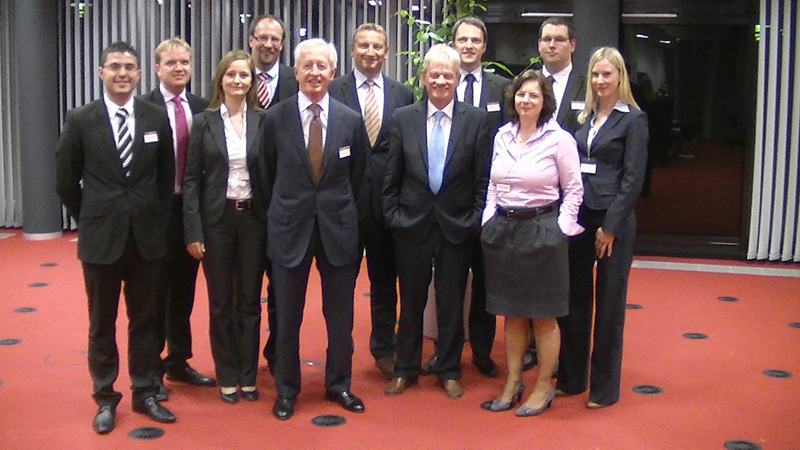
Péter Horváth (left) congratulates Hansgrohe CEO Siegfried Gänßlen, whose team received the Green Controlling Award 2012. In the middle left Daniel Ette from the Controlling team, to the right Dr. Carsten Tessmer, Head of Communications at Hansgrohe.
Hansgrohe SE from Schiltach in the Black Forest has been given the Green Controlling Award by the Péter Horváth Foundation in cooperation with the International Association of Controllers (ICV) for its controlling solution “Green Controlling – Green Profit – Green Future”.
The Award worth EUR 10,000 in money was given for the second time at the “10th Controlling Competence Stuttgart – CCS 2012” conference. The Hansgrohe controlling team accepted the Award at the IBM Forum in Ehningen from the hands of Chairman of the Jury Prof. Dr. Dr. h.c. mult. Péter Horváth (Horváth AG, IPRI gGmbH, Head of the ICV Think Tank).
Péter Horváth explained the Jury’s decision in a laudatory speech. He noted that the controlling community has “recognized the importance of the ecological dimension of sustainability for its own work”. “In corporate practice, there are now encouraging approaches to developing and implementing environmental management.” However, this is often still done too narrowly in the sense of rather technically-oriented “isolated solutions” without integrating controlling. This is where controllers are called upon.
The Péter Horváth Foundation gives the Green Controlling Award to the most innovative and effective controlling solution for the design and implementation of ecologically oriented strategies, programs and projects. The Award is given for integrative solutions that have been significantly initiated or co-designed by controllers in companies and public institutions.
As “business partners of management”, the controllers have the task of ensuring that “green issues are in the black”, said the Chairman of the Jury. “We have to ensure that the balance between the three pillars of sustainability – economy, ecology and social issues – is maintained.” In his laudatory speech, Péter Horváth outlined “a threefold challenge for the controller”: what is needed is an “integrated overall system for managing all environment-related activities that is coordinated with the corporate strategy”; this requires clear key performance indicators (KPIs) that enable target-oriented economic management; finally, this system must be implemented, maintained and further developed. “Our award winner this year has developed and implemented an overall concept in an almost ideal way, which consistently and systematically integrates environmental orientation at all company levels of strategy, planning and management. Controlling is a ‘business partner’ on the way to becoming a ‘green company’.”

The Carbon Accounting & Controlling team at Deutsche Post DHL (DPDHL) has been given the first Green Controlling Award by the Péter Horváth Foundation in cooperation with the International Association of Controllers (ICV) for its controlling solution as part of its “GoGreen” environmental protection program. The transparency created by the controller team enables, above all, the identification of financial risks and the effective management of ecological measures.
The DPDHL Carbon Accounting & Controlling team accepted the award at the “Controlling Competence Stuttgart – CCS 2011” conference at the IBM Forum in Ehningen from the hands of Chairman of the Jury Prof. Dr. Dr. h.c. mult. Péter Horváth (Horváth AG, IPRI gGmbH, Head of the ICV Think Tank) and ICV Chairman of the Board Siegfried Gänßlen (CEO Hansgrohe AG). “Carbon management is a social task that we at Deutsche Post DHL are tackling consistently and across all divisions,” said Melanie Kreis, Executive Vice President Corporate Controlling at Deutsche Post DHL. “Today’s award is recognition of this holistic approach and at the same time reflects the commitment of the many employees from the various divisions involved in the process.”
The criteria “outstandingly fulfilled”
Developing and introducing environmental management in corporate practice that goes beyond technically-oriented “isolated solutions” requires the involvement of controlling. As the Jury Chairman, Prof. Dr. Dr. h.c. mult. Péter Horváth, explained in his laudatory speech, this poses a threefold challenge for controllers: “Firstly, an integrated overall system for managing all environment-related activities that is coordinated with the corporate strategy is required. Secondly, clear KPIs (Key Performance Indicators) are required to enable target-oriented economic management. Thirdly, this system must be implemented, maintained and further developed,” says Horváth.
The Green Controlling Award winners from Deutsche Post DHL have developed an environmental controlling system that meets all the criteria “outstandingly well”, according to Péter Horváth. It is the core of a strategy-oriented overall program to support management. A comprehensive set of KPIs for controlling ensures that planning, reporting and control can be implemented at all levels of the company. There are also clear controller tasks for the implementation, maintenance and further development of the system, which has also been rolled out company-wide.
Controllers as partners in CO2 management
As a globally active and leading logistics service provider with around 470,000 employees, Deutsche Post DHL moves goods and information worldwide. As part of its role as a driver of global trade, the company also generates significant CO2 emissions. “In order to live up to the responsibility this gives us for our climate, we have launched the GoGreen environmental protection program,” explained Stefan Freigang, responsible for Carbon Accounting & Controlling in DPDHL’s Group Controlling, who presented the solution at the CCS 2011 plenary session. Carbon Accounting & Controlling supports the Group’s GoGreen program, which has set itself the goal of improving its own CO2 efficiency – including the activities of subcontractors – by 30% by 2020 compared to the base year 2007. According to Stefan Freigang, this improvement is being promoted by numerous centralized and decentralized measures.
The Group-wide Carbon Accounting & Controlling program is being driven forward by a new department set up in Group Controlling in 2010. The innovative aspect of the award-winning solution concept is the consistent integration of the controlling of CO2 efficiency targets into the organization, processes and systems of the finance department. In addition to annual disclosure, ongoing management reporting is set up during the year to ensure effective control. The tools developed also allow forecasts, target planning and the calculation of measures to increase efficiency.
“Controllers play a key role in the design, implementation and application. In addition to traditional financial issues, they are now increasingly becoming a partner to management in the context of carbon controlling,” continues Stefan Freigang. Carbon controlling is the result of cooperation between controllers and managers. The transparency created about current actual emissions enables financial risks to be identified and ecological measures to be managed effectively. Carbon controlling thus supports management in decision-making and corporate management by preparing and communicating facts and model calculations on the possible economic and ecological effects.
In 2010, the International Association of Controllers (ICV) and its Think Tank, a team of academics and controlling practitioners led by Prof. Dr. Dr. h.c. mult. Péter Horváth, focused on “green controlling”. This work has been continued since fall 2011 in a new Expert Work Group Green Controlling. To promote the topic, the Péter Horváth Foundation, in cooperation with the ICV, presents an annual award for the most innovative and effective “green” controlling solution.Deutsche Post DHL is the world’s leading postal and logistics group. The Group brands Deutsche Post and DHL stand for a unique portfolio of logistics (DHL) and communication (Deutsche Post) services. The Group offers its customers both easy-to-use standard products and customized, innovative solutions – from dialog marketing to the industrial supply chain. Its approximately 470,000 employees in more than 220 countries and territories form a global network focused on service, quality and sustainability. The Group assumes social responsibility with its programs in the areas of climate protection, disaster relief and education. Deutsche Post DHL generated revenue of more than 51 billion euros in 2010. The Logistics company for the world.
Cooperation Partners

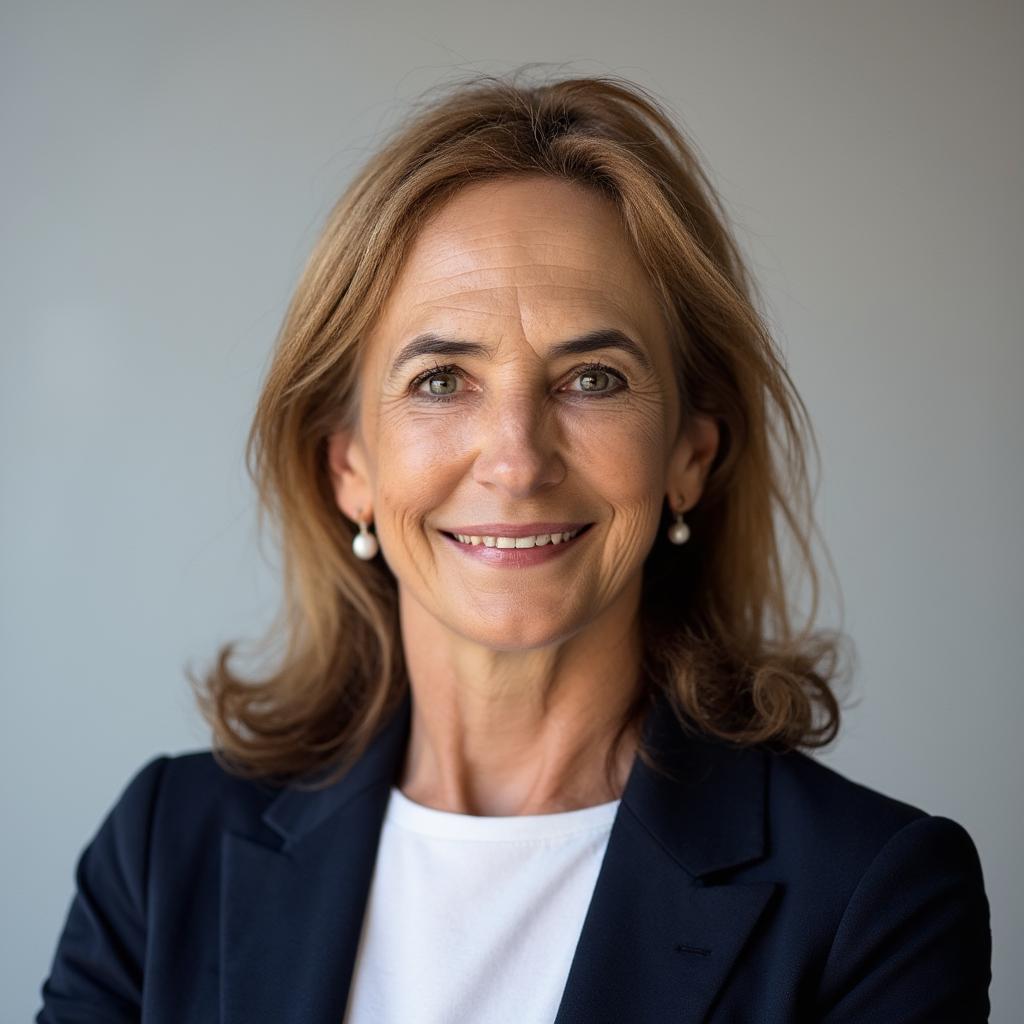
Your contact person
Carmen Zillmer
Managing Director
Münchner Straße 8
D-82237 Wörthsee
Phone: +49 (0) 8153 88974-38
E-mail: c.zillmer@icv-controlling.com





